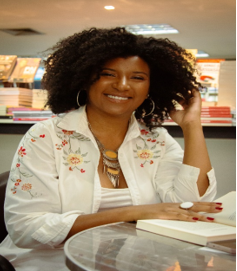Visiting Scholars

Wenjiao Li - Academic Visitor (Jan - July 2024)
Wenjiao Li (Changsha, Hunan, China) is a lecturer from Hunan Normal University, China. She has years of experience in teaching English as a Second Language. She is a member of American Studies Center at Hunan Normal University. She was funded to visit National Institute of Education, Nanyang Technological University, Singapore as an academic visitor.
Her research areas include teaching English as a second language, ESL teaching methodology, and intercultural communication studies. She has been a national speaker, with a body of academic work, including journal articles, book chapters, and academic conferences.
Currently, she is engaged in research related to English language learning through methodologies such as POA (Production-Oriented Approach). She is also a key member of the research team on “AI Assisted Targeted International Communication”.

Hislla S. M. Ramalho - Academic Visitor (Dec 2023 - June 2024)
Hislla S. M. Ramalho is a PhD Candidate in the Post-Graduation Program in Translation Studies (PGET) at the Federal University of Santa Catarina (UFSC). She is a visiting scholar at the University of Alberta, Department of Modern Languages and Cultural Studies under the supervision of Dr. Dirce Waltrick do Amarante and Dr. Odile Cisneros. Her studies focus on the translation of Black women writers such as Sindiwe Magona and her dissertation is entitled South Africa and Brazil, a relation in translation – translating Sindiwe Magona’s short stories. She also worked in collaboration with colleagues on a Mary Ann Shadd project that entailed translating A plea For Emigration. In addition, she explores work on Post Colonialism; Gender, Race and Feminist Studies; Capitalism and Publishers. She is a teacher, translator and currently participates in a group called NEPFIR (Núcleo de Escritoras Pretas Maria Firmina dos Reis) from the University of Brasilia.
Former Visiting Scholars
2023
Dr. Yolanda Natalia Alvarez Gomez - Academic Visitor (2023)
2022
Dr. Alex Averbuch - Postdoctoral Fellow (2022-2023)
Dr. Magdalena Kaltseis - Postdoctoral Fellow (2022)
Dr. Lisa Ortiz-Vilarelle - Fulbright Scholar (2022)
2021
Dr. Maxime Bock - Postdoctoral Fellow (2021-2022)
Dr. Bettina Egger - Austrian Visiting Professor (2021-2023)
2020
Dr. Florian Mundhenke - DAAD Visiting Associate Professor (2020-2023)
2019
Dr. Maria Mayerchyk - Huculak Research Felow (2019-2020)
Dr. Iryna Skubii - Stuart Ramsay Tompkins Visiting Professorship (2019-2020)
Dr. Wolfgang Stadler - University of Innsbruck (Austria) - September 2019
Dr. Yanyu Zeng - Hunan Normal University, China - November 2019
Dr. Encarnación Gutiérrez Rodríguez - Visiting Professor (October 2019-March 2020)
2018
Dr. Tatiana Saburova - Stuart Ramsay Tompkins Visiting Professorship (2018-2019)
Anna Seidel - DAAD German Academic Exchange Service research; Graduate Academy of TU Dresden
Marianna Novosolova - DAAD German Academic Exchange Service/ research
Dr. Paulo Andrade - Brazilian Visiting Scholar